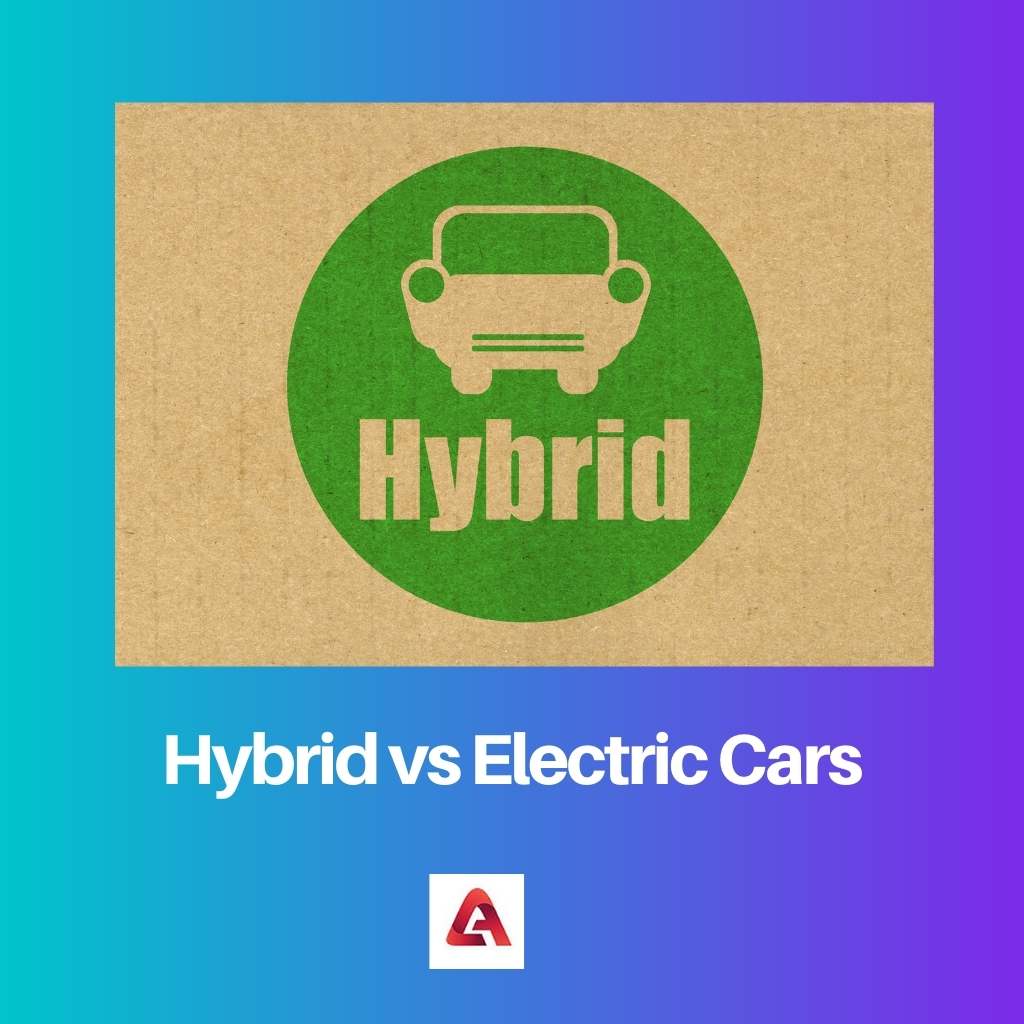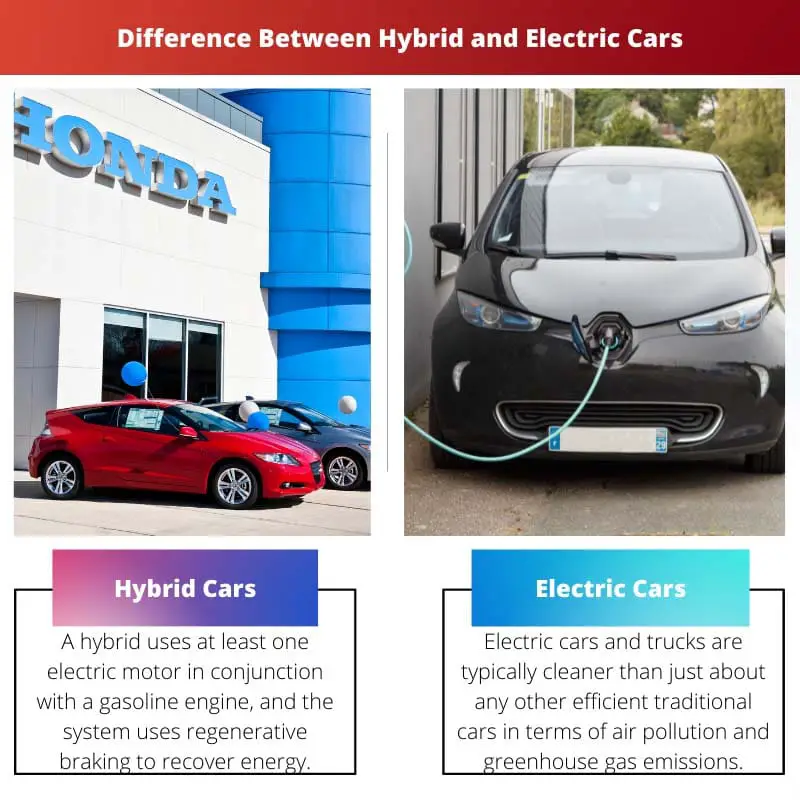Many different types of automobiles are on the market to meet the demands of different clients. Every year, the automotive industry’s leading manufacturers introduce new automobile models.
The automobile sector is progressively migrating from petrol and diesel cars to hybrid and electric cars since the government is concerned about environmental pollution in the country’s capital city.
Key Takeaways
- Hybrid cars use a gasoline engine and an electric motor to power the vehicle, while Electric cars are powered solely by an electric motor.
- Hybrid cars have a longer range than electric cars and can refuel at gas stations, while electric cars need to be recharged at charging stations.
- Hybrid cars are more suited for long-distance driving, while electric cars are more suited for short-distance driving and city commuting.
Hybrid vs Electric Cars
Hybrid cars use both gasoline and electric power to propel the vehicle. They have a smaller battery pack than fully electric cars, meaning they can’t travel as far on electric power alone. Electric cars run on electricity and can travel up to several hundred miles on a single charge, making them environmentally friendly.

If a vehicle is 100 per cent gasoline-fueled yet does not rely exclusively on its gasoline engine for propulsion, it is classified as a hybrid.
Hybrids also feature electric motors that assist in delaying the usage of the gasoline engine and, thus, save fuel. For extra power, both systems can function together at times.
When the brakes are applied, the electric motors turn into generators. The energy recovered during braking is stored in a compact battery for use the next time acceleration from a stop occurs.
An electric car is an alternative fuel vehicle that propels itself using electric motors and motor controllers rather than more traditional propulsion techniques such as internal combustion engines (ICE).
Electricity may be utilized to power the battery of electric cars as a transportation fuel. Electric vehicles use an energy storage device like a battery to store power.
An electric motor drives the vehicle’s wheels with electricity. Electric vehicles have limited energy storage capacity, which must be supplied by connecting to a power source.
Comparison Table
| Parameters of Comparison | Hybrid Car | Electric Cars |
|---|---|---|
| Engine | Combination of an internal combustion engine (ICE) with an electric motor. | Electric motor. |
| Emissions | The emission level is more than that of electric cars. | Environment-friendly. |
| Power source | Electricity and fossil fuel. | Electricity from DC battery pack. |
| Charging | Not required. | Required. |
| Price | Less costly than electric ones. | Expensive in comparison to hybrid. |
What is Hybrid Car?
A hybrid uses at least one electric motor with a gasoline engine to move the automobile, and the system uses regenerative braking to recover energy.
The electric motor does all the work occasionally, the gas engine does it other times, and they sometimes collaborate. As a result, less gasoline is consumed, resulting in improved fuel efficiency.
In some cases, adding electricity can improve performance.
When extra power is needed, the hybrid car’s Quick acceleration capability allows it to switch from an electric motor to the main engine. When travelling uphill, this is more prevalent.
Mild hybrid technology is one of the most recent advancements in hybrid technology. In a hybrid car, the two drive systems can interact in various ways, and the drive types can be viewed differently. The amount of electrification varies among hybrids.
The braking energy is recovered and stored in a traditional 12V starting battery using a micro hybrid’s automated start-stop mechanism.
However, because an internal combustion engine only powers the vehicle, several driving classifications do not include tiny hybrids as a hybrid concept.
Micro hybrids, in other terms, are vehicles with an internal combustion engine (ICE) and well-designed drive electronics. The amount of gasoline that is saved is little.
When the vehicle is propelled from a stop, the mild-hybrid system offers a little boost to the gasoline engine.
Because they obtain energy from the combined power of a gasoline engine and regenerative braking, these engines do not need to be plugged in and are found in 48-volt electric systems. Various other types are categorized under hybrid, namely full hybrids and plug-in hybrids.

What are Electric Cars?
Electric cars and trucks are cleaner than any other efficient traditional cars in terms of air pollution and greenhouse gas emissions.
The degree of cleanliness varies depending on the kind of vehicle and the source of power. When the cleanest electrical networks fuel battery-electric EVs, EV emissions are equivalent to a car that gets more than 100 miles per gallon.
Charging and running an EV may be almost emission-free when powered entirely by renewable energy sources such as solar or wind.
Although electric automobiles are more expensive to buy than conventional cars, the greater upfront cost is sometimes offset by federal and state subsidies.
Refuelling an electric car may also be a quarter of the cost of gasoline, resulting in a reduced total cost of ownership for electric automobiles.
The electric vehicle is convenient to charge, and the greatest thing is that there is no requirement to stop at a gas station before embarking on the journey.
An electric automobile might be charged using a standard home outlet. The most significant benefit of an electric car is its environmental credentials.
Electric automobiles are completely environmentally beneficial since their engines are powered by electricity. Because it works on a clean energy source, it produces no poisonous fumes or smokes into the environment.

Main Differences Between Hybrid and Electric Cars
- Hybrid automobiles combine an internal combustion engine (ICE) with an electric motor, whereas electric cars are completely electric and rely only on rechargeable batteries to power the electric motor.
- Because fully electric cars do not utilize gasoline, they are greener, cleaner, and more environmentally friendly than petrol or diesel automobiles. However, hybrid cars have greater emission levels than fully electric cars.
- The power source of hybrid cars is electricity and fossil fuel, whereas electric cars operate on electricity through a DC battery pack.
- In a completely electric automobile, there is no alternative gasoline engine to power the electric motor if the battery runs out of charge. Hence it must be recharged, whereas hybrid cars do not require charging.
- Electric cars are costlier in comparison to hybrid cars.

- https://ieeexplore.ieee.org/abstract/document/4581321
- https://www.sciencedirect.com/science/article/abs/pii/S0378775305016502

I’m really excited to read everything on the differences between hybrid and electric vehicles. This will definitely help me make an informed decision when buying my next car!
Yes, I totally agree. It’s important to know the specific differences between the two options!
This article makes it clear that electric cars are the environmentally friendly option. I think I’m swayed toward purchasing an electric car next.
Absolutely, the environmental benefits are a major factor that consumers should consider when making a decision about their next car.
This article is definitely a must-read for anyone considering an electric car. It addresses all the questions and concerns I had!
Absolutely! It’s great to have such detailed information available for consumers.
Definitely an enlightening piece, making the choice between hybrid and electric cars much clearer.
I appreciate the detailed explanation of the differences between hybrid and electric cars. This will help everyone understand their options better!
Yes, definitely! It’s crucial to have a clear understanding of both options before making such an important decision.
The article is insightful and comprehensive, making it clear that electric cars have a lot of advantages compared to traditional vehicles.
I’ve been considering moving to an electric car for a while now. This article has provided all the information I need to make an informed decision.